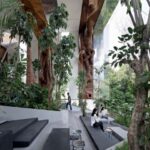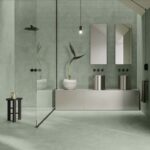Yucatecan home is a pastel dream inspired by its surrounds
Casa Houlpoch is an old Yucatecan house from the end of the last century that gets its name from a snake from the region that regularly “visited” the property’s ruins.
The room, in pastel tones, has modern and casual furniture, integrating greenery and works of art, such as a playful Timoteo on the center table and a painting by Pedro Friedeberg on the sofa, crowning the space.

GALLERY
The kitchen, with coatings in paste and quartz, has a reinterpretation of the old Yucatecan bells on the stove. The hanging lamps harmonize the space and are integrated into the wooden furniture such as the tzalam benches and the dining room, which was brought from Mozambique, a country where the Dutch owners lived before settling in the Yucatan peninsula.
The dining room is connected to the terrace through a window, generating a feeling of spaciousness and clarity where the visuals escape to the exterior. It is in this last space where through decoration and furniture, the three cultures with which the owners identify themselves converge, the table, its centerpiece, and the drum, were brought from Mozambique, as well as the patterns on fabric that surround two Utrecht chairs by Dutch designer and architect Gerrit Rietvelt.
On the sofa rests a painting by the Mexican artist Fernando Andriacci and on the opposite side, there is a cow’s head adorned with beads from Huichol art and just below a traditional Dutch bicycle in the colors of the Prinsenvlag.
In the central courtyard, a chukum pool surrounds the stone vestiges of an old colonial structure where a large poplar tree generates a spectacular play of light and shadow with its frond, creating the perfect atmosphere to host an outdoor kitchen.
The volumetry of the back of the property reads as a totally disruptive design with respect to the historical part of the residence where the steps to the second level (where two rooms and a terrace are located) serve as a visual axis and as an element. The “winding” with which the stairs of Houlpoch House begin takes as its inspiration the millenary staircase of the ancient temple of Kukulkán (Feathered Serpent and god in Mayan mythology) in Chichén Itzá.
With a much simpler design, the master bedroom on the first level features a headboard made of pasta tiles on which a Neon Caron painting rests. The visuals from the bed, escape to an interior garden, the pool and the tropical gardens.
At Houlpoch House we seek to respect and rescue the historical values of Yucatecan colonial architecture, combining them with contemporary details and volumes; and with the comforts of today’s life, in a reinterpretative, pure, and sober way, creating different atmospheres to relax, to live together and to enjoy the outdoors in the warm peninsular climate.
Images by Tamara Uribe via ArchDaily
Studio Tate has completed a lavish redesign of the 17th floor of a distinctive hexagonal building in Melbourne, ...
Red sculptural interventions define the interior of ARKS’ new flagship store in Bandra West, Mumbai, where Anagram Architects ...
Work is set to begin on a new 12-storey mixed-use affordable housing development in Adelaide’s inner north-west, marking ...
Frame Garden Café, known as Tanatap, represents another prototype in an evolving series of multi-level greenspaces that challenge ...
Italian brand Casalgrande Padana has built a reputation as a prolific producer of ceramic and stoneware tiles, translating ...












